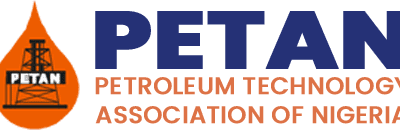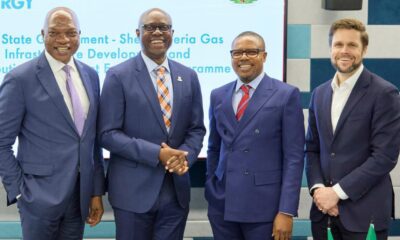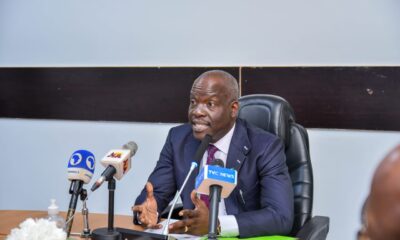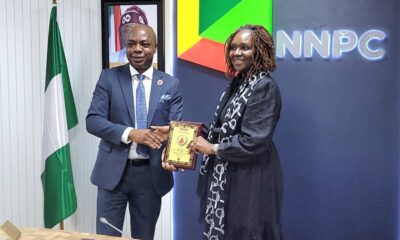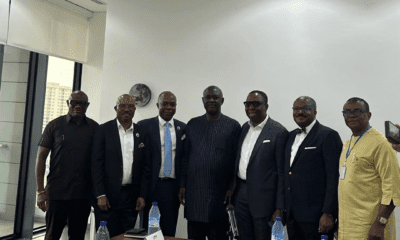Energy
Shell’s history-making strides in Nigerian content development
September 1, 2004, was like any other Wednesday in the Niger Delta. But it was strikingly different for one man and his company. The man walked into his office in Port Harcourt and took his seat, and Nigerians rose to their feet to celebrate history. Mr. Basil Omiyi had just spent his first minutes in office as the pioneer Nigerian Managing Director of The Shell Petroleum Development Company of Nigeria Ltd (SPDC.) It was the first time a Nigerian would assume the leadership of a Nigerian subsidiary of an international oil and gas company and the media and other industry watchers hailed the appointment as a good omen for developing Nigerian muscle in the industry.
The meaning of the moment was also not lost on Mr. Omiyi, an industry veteran who joined SPDC in 1970 as trainee petroleum engineer. “I am honoured to be the first of what I expect will be many Nigerians to hold the post,” he said. He and other Nigerians calling for more of the same have not been disappointed. Some 18 years after he walked into the C-Suite, the third Nigerian is in place as the MD of Nigeria’s premier oil and gas company. Not only that, the two other Shell companies in Nigeria, Shell Nigeria Exploration and Production Company (SNEPCo) and Shell Nigeria Gas (SNG) are also headed by Nigerians.
The appointment of Nigerians into key posts is only one aspect of a deliberate effort by Shell to encourage Nigerian content development, which for the over 60 years of Shell’s operations in Nigeria, has ranged from developing talents and supporting contractors and suppliers to provide services in critical areas of the upstream businesses. The socio-economic spin-offs include employment creation, enterprise development in the Niger Delta and Nigeria as a whole. In May last year, Shell companies were named the International Oil Company with the most impactful local content initiatives at the Nigerian Oil and Gas Opportunity Fair.
The Petroleum Technology Association of Nigeria (PETAN) honoured Shell Companies in Nigeria as the best local content operators at its 2022 industry dinner and awards held in Port Harcourt, the Rivers State Capital, last month. The Managing Director of SNEPCo, Mrs. Elohor Aiboni, was also named sole recipient of the PETAN Chairman Outstanding Achievement Award, while her predecessor, Mr. Bayo Ojulari, clinched the PETAN Distinguished Achievement Award.
PETAN should know. Based in Port Harcourt, this association of more than 80 indigenous technical oilfield service companies in the upstream and downstream sectors with a combined annual revenue of more than $500 million, promotes the development of the oil and gas industry in Nigeria through their services and contributions to policy ideas and formulation. “Shell companies have always stood by local service companies, and they have been part of our local content journey right from the beginning, and have been consistent,” PETAN Chairman Nicholas Odinuwe, said while handing the award to Shell’s representatives. Mr. Odinuwe described Shell companies as a major pillar to the growth of local content in Nigeria by driving the pre-legislation initiatives and providing funding intervention to give opportunity to even start-ups in the service sector to play in the oil and gas supply chain.
Efforts by Shell companies to develop Nigerian content in their operations pre-date the establishment of the Nigerian Content Development and Monitoring Board (NCDMB) in 2010. These efforts have facilitated the growth of Nigerian businesses in the manufacture of tools and technical kits, operation of helicopter flights in the Niger Delta and strategic partnerships between foreign and local companies to stimulate technology transfer and capacity development. Thus, the Nigerian content development strategy of Shell companies is consistent with the framework of the NCDMB with strong emphasis on research and development, promotion of local manufacturing, indigenous asset ownership and human capacity development. Among other achievements, Shell Nigeria deployed contractor support fund to enable indigenous entrepreneurs to gain access to credit and sponsoring research in Nigerian universities with the objective of creating local alternatives to imported fluids and additives.
In 2021, Shell Companies in Nigeria awarded contracts worth $800 million (the same as in 2020) to Nigerian-registered companies, of which 92% was to companies where the Nigerian ownership was at least 51%. Also in 2021, More than 8,500 contractors supported the operations of the companies last year. Recognising the global nature and standards of oil and gas production, Shell does not just award contracts to Nigerians and leave them on their own to struggle for the necessary certifications and improvement of skills. It works with such companies to improve management systems and technical capacity and achieve the necessary certification for their products and services so that they can qualify for tenders and contracts to provide goods and services not only across Shell’s operations and the Nigerian oil and gas sector but also in sub-Saharan Africa. For example, Caverton Nigeria Ltd which operates in West Africa benefitted from Shell’s support for developing standards to global levels when it started helicopter services for Shell Nigeria. Apart from technical support, Shell Companies in Nigeria have helped to solve the challenge of contract financing by establishing the Shell Contractor Support Fund in 2012. Nearly $1.6 billion has been provided as loans to 901 Nigerian vendors since the inception of the Fund.
But it is in deep water that Shell’s efforts at Nigerian content development have been very pronounced. The development of the Bonga field by SNEPCo in 2005 gave rise to the first generation of Nigerian deep-water oil and gas engineers. SNEPCo hired Nigerian engineers who cut their teeth on this project, developing knowledge and skills that would advance the country’s oil and gas production and exploration capacity. The company awarded major engineering and construction contracts to indigenous companies which were involved in the installation of new production manifolds, subsea umbilical systems, oil production and water injection flowlines. In 2019, a local company refurbished one of Bonga’s subsea wellhead control systems, known as a Christmas tree. Today, wholly indigenous companies manufacture and rebuild hydraulic flying leads (HFLs) in-country in a major technical breakthrough. A Nigerian company also continues to refurbish old subsea Christmas trees. Nigerian companies also played key roles in the seventh turnaround maintenance of the Bonga field which was successfully undertaken in October 2022.
In recognition of these efforts, the NCDMB Executive Secretary, Mr. Simbi Wabote, paid glowing tribute to Shell for being the first international oil company in Nigeria to demonstrate belief in the capabilities of Nigerian companies and give them the inroad to participate fully in the oil and gas industry. He was speaking at a local content workshop for the judiciary in Bayelsa State. No doubt, the pioneering efforts of Shell have helped the NCDMB to achieve nearly 50 per cent local content attainment in the Nigerian oil and gas industry. This translates to retention of over $8 billion of the $20 billion annual spending in the industry. The NCDMB is looking to achieve 70 per cent local content penetration by 2027. The Board and indeed Nigerians can continue to count on the history-making strides of Shell in Nigerian content development. This is a guarantee of more Mr. Omiyi moments.
Energy
Over 500mmscf/d gas supply projects to be commissioned — Presidency
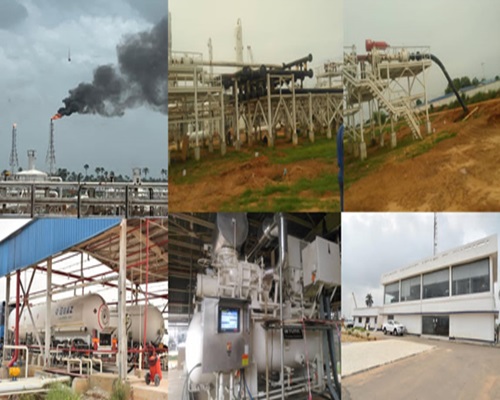

The Presidency has disclosed plans to commission over 500mmscf/d gas supply projects across the country.
This is in line with the country’s move to transition from fossil fuels to gas according to its Decade of Gas initiative.
In a press statement on Friday, the spokesperson to the President, Ajuri Ngelale outlined three projects the President is billed to commission.
The statement reads: “In line with his commitment to significantly leverage gas to grow the economy, President Bola Tinubu will commission three critical gas infrastructure projects being undertaken by the Nigerian National Petroleum Company Limited (NNPCL) and partners.
“The projects support the federal government’s effort to grow value from the nation’s gas assets while eliminating gas flaring.
“The delivery of the projects was accelerated from the inception of the administration in keeping with the overall objective of deepening domestic gas supply as a critical enabler for economic prosperity.
“The projects lined up for commissioning include: (1) AHL Gas Processing Plant 2 (GPP – 2) – 200mmscf/d. This project is an expansion to the Kwale Gas Processing Plant (GPP – 1), which currently supplies about 130MMscf/d of gas to the domestic market. The processing plant is designed to process 200MMscf/d of rich gas and deliver lean gas through the OB3 Gas Pipeline. This additional gas supply will support further rapid industrialization of Nigeria. ”The plant will also produce about 160,000 MTPA of Propane and 100,000 MTPA of Butane, which will reduce the dependency on LPG Imports. The AHL Gas Plant is being developed by AHL Limited, an incorporated Joint Venture owned by NNPC Limited and SEEPCO.”
“(2) ANOH Gas Processing Plant (AGPC) – 300MMscf/d. The ANOH gas plant is an integrated 300MMscf/d capacity gas processing plant designed to process non-associated gas from the Assa North-Ohaji South field in Imo State. The plant will produce dry gas, condensate, and LPG. The gas from ANOH gas plant will significantly increase domestic gas supply, leading to increased power generation and accelerated industrialisation. The ANOH Gas Plant is being developed by ANOH Gas Processing Company, an incorporated Joint Venture owned by NNPC Limited and Seplat Energy Plc on a 50-50 basis.
“(3)ANOH-OB3 CTMS Gas Pipeline Project. The project involves the engineering, procurement, and construction of 36”x23.3km ANOH-OB3 Project. The Transmission Gas Pipeline will evacuate dry gas from the Assa North-Ohaji South (ANOH) primary treatment facility (PTF) to OB3 Custody Transfer Metering Station (CTMS) for delivery into the OB3 pipeline system. About 600MMscf/d is estimated to be available from two separate 2 x 300MMscf/d capacity gas processing production trains from AGPC & SPDC JV.”
“When commissioned, the projects will increase gas supply to the domestic market by approximately 500mmscf/d, creating a better investment climate and promoting balanced economic growth cumulatively.”
Energy
Shell signs agreement to build gas pipelines in Oyo State


Shell Nigeria Gas, SNG, and the Oyo State Government have signed an agreement to develop a gas supply and distribution infrastructure that will deliver gas to industrial and commercial users in the state.
A statement released on Friday by Shell Nigeria’s Media Relations Manager, Abimbola Essien-Nelson, disclosed that SNG will build and operate the gas distribution network, which will serve customers across Oyo State for 20 years.
According to the statement, the project will start with the construction of gas distribution infrastructure along a 15km pipeline route, adding that it will grow to deliver up to 60 million standard cubic feet of gas per day across the state.
Speaking at the signing ceremony, the Oyo State Governor Seyi Makinde, described the project as a catalyst for development in the state.
The Managing Director of SNG, Ralph Gbobo, noted that the agreement was “a significant milestone for SNG and Oyo State to boost economic activities in Nigeria by supplying industries and manufacturers with natural gas, a more reliable, cost-efficient and environmentally friendly source of energy.”.
He explained that the project would boost Oyo State’s internal revenue and create Job opportunities for indigenes.“
“The Managing Director of The Shell Petroleum Development Company of Nigeria Limited and Chairman, Shell Companies in Nigeria, Osagie Okunbor, remarked that the event pointed to the value of partnership as “Shell continues to power progress” in Nigeria through more and cleaner energy solutions for commercial and industrial customers.
Energy
Nigeria ripe for nuclear power to boost electricity generation – NAEC


The Nigeria Atomic Energy Commission (NAEC) in collaboration with Centre for Energy Research and Training (CERT), Ahmadu Bello University (ABU), Zaria would deploy nuclear science and technology to strengthen electric power generation in Nigeria.
Prof. Yusuf-Aminu Ahmed, Chairman NAEC disclosed this during the 20th Anniversary Symposium of the Nigeria’s first Nuclear Research Reactor-1 (NNR-1) in Zaria on Thursday.
Ahmed said the experience developed over the years on nuclear power at the centre makes Nigeria ripe and ready to go into the next level of power generation through the nuclear reactor.
“We have used the reactor for research and development over the years and now we are going to use the reactor for the purpose of generating electricity.
“President Bola Tinubu has already given the commission a mandate to see how it contributes in the clean energy sphere of Nigeria and the nuclear energy programme of Nigeria would participate,’’ Ahmed said.
He explained that the time for the project would not be open for the public; however, Ahmed added that international partners and vendors were working closely with the commission over the project.
He also said that intergovernmental agreements were signed with some of the vendors on the nuclear power in Nigeria and very soon President Tinubu would make an announcement on the issue.
Earlier, Sen. George Akume, Secretary to the Government of the Federation said the 20 years of safe operation of the nuclear research reactor was an indication that Nigeria has joined the campaign for safe application of nuclear energy.
Akume, represented by his Special Assistant on Technical Issues, Prof. Bolaji Babatunde, added that since the centre had safely operated the nuclear research reactor for 20 years, it can also obtain a nuclear reactor for electricity generation.
According to him, the process of having a reactor that would generate electricity is similar to operating a nuclear research reactor.
“President Tinubu has re-echoed the need for having nuclear energy into the sources of electric power generation in Nigeria and Nigerians should look forward to this power.
“Electricity generated through nuclear energy is clean and safe except for human errors or natural causes such as the one that happened in Hiroshima,’’ he said.
Earlier, Prof. Sunday Jonah, Director of the center said the event was to celebrate 20 years of safe operation, maintenance and utilisation of the first Nuclear Research Reactor code named NNR-1.
However, in spite of the numerous gains at the centre over the years, the Director lamented over a plot by NAEC to wrestle the centre from the university through the proposed NAEC Bill 2022.
He explained that such a move would negate the dreams of the founding fathers that established the centre in universities because of the culture of research and development being promoted at designated universities.
-
capital market2 years ago
Rt.briscoe, FBNH, Others halts negative performance of stock market
-
Finance3 months ago
Court orders Sen. Victor Umeh to repay N136m bank debt to AMCON
-



 Abuja Update2 months ago
Abuja Update2 months agoUNDP, FG partnership needed to achieve inclusion, equity- Minister
-
Abuja Update1 month ago
Banks drive stock market performance with N147bn gain
-



 Business2 weeks ago
Business2 weeks agoTingo Group unveils Tingo Electric, Tingo Cola drink at Lagos launch
-



 Health3 weeks ago
Health3 weeks agoCapacity training will reduce migration of health workers- NPHCDA
-
News4 months ago
Oil thieves sponsoring malicious media campaign against Navy – Spokesman
-



 Infotech1 month ago
Infotech1 month agoWorld Backup Day: NITDA urges Nigerians to ensure backup of data

